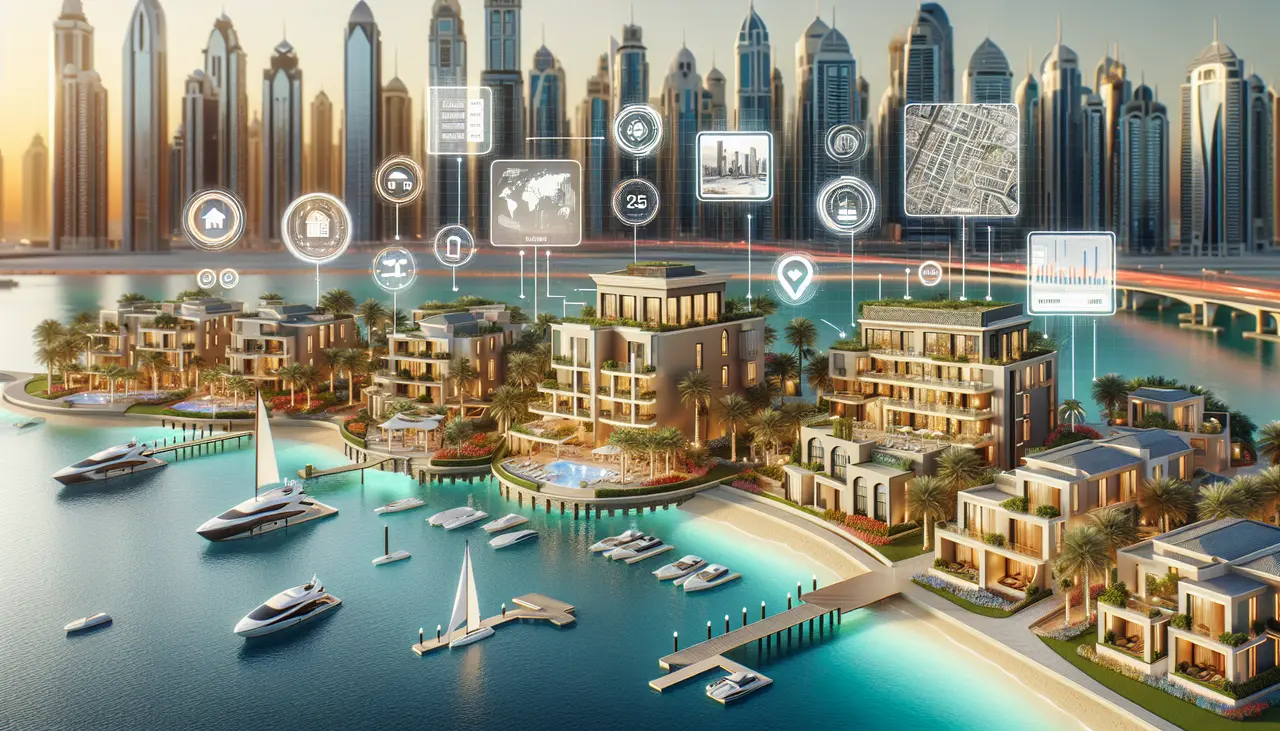The Insider’s Guide to Maximizing Returns on Dubai Real Estate Investment
Introduction to Dubai Real Estate Investment
Dubai’s real estate market is a playground for the savvy investor. With its iconic skyline and world-class amenities, the city attracts people from all corners of the globe. If you’re eyeing Dubai for your next investment, you’re in smart company. But to get ahead, you need more than just money; you need know-how. Let’s break it down. First, understand that Dubai offers a wide range of properties, from luxurious villas to high-rise apartments. The city’s real estate market is known for its robust growth and potential for high returns. However, like any investment, it comes with its risks. You’ll need to research thoroughly, considering factors such as location, property type, and market trends. The government of Dubai has made it welcoming for foreign investors, allowing full ownership in freehold areas. Plus, the absence of property taxes makes investing here even more attractive. Remember, investing in Dubai isn’t just about buying a property. It’s about making informed decisions that will maximize your returns in the long run. Keep it simple, do your homework, and your investment could turn into your next big win.
Why Invest in Dubai Real Estate?
Dubai’s real estate market is a goldmine for investors for a slew of reasons. First off, tax-free rental yields. Yes, you heard that right. In Dubai, there’s no tax on rental income, which means more money in your pocket. Then there’s the high demand for property, fueled by Dubai’s growing economy and its spot as a global business hub. Plus, let’s not overlook the robust rental market. With an ever-increasing expat population, the demand for rental properties is through the roof. And if you’re looking for variety, Dubai’s got it. From luxury villas to chic apartments, there’s something for every taste and budget. So, investing here? It’s not just about owning a piece of property; it’s about grabbing a slice of a thriving, dynamic market.
Understanding the Dubai Property Market
Dubai’s property market is unique and a goldmine for investors who know how to navigate it. The city is a hub for luxury, innovation, and growth, making it a prime place for real estate investment. First things first, understand the types of properties available. There are villas, apartments, and townhouses, each with its pros and cons depending on your investment goals. Location is key in Dubai. Areas like Marina, Jumeirah, and Downtown are hot spots for high rental yields. However, if you’re looking for appreciation, emerging areas like Dubai South are worth considering. Another point to factor in is the freehold versus leasehold ownership. Freehold allows you to own the property outright, appealing to foreign investors. Leasehold, on the other hand, gives you rights to the property for a period, usually 99 years. Lastly, the market’s performance is seasonal and influenced by factors like government policies, global economic conditions, and tourism trends. Keeping a finger on the pulse of these changes can help you make informed decisions. So, understanding the Dubai property market’s dynamics is crucial for maximizing your returns. Do your homework, and consider these key aspects before diving in.
Types of Properties Available for Investment in Dubai
In Dubai, you’ve got a world of options when it comes to properties for investment. Let’s break it down simply. First off, you have residential properties. These include apartments and villas, great for renting out to families or professionals. Next up are commercial properties. Think offices, retail spaces, or warehouses. These are prime spots for businesses looking to set up shop in Dubai’s bustling economy. Then, there’s mixed-use properties. A mix of both worlds, these buildings offer residential and commercial spaces in one location, providing a versatile investment. Lastly, for those looking at long-term growth, off-plan properties from developers can be a golden opportunity. Buying before construction completes can snag you a deal below market value. Each type of property has its own charm and challenges, but the chance to grow your investment in Dubai is clear across the board.
Key Factors Influencing Dubai Real Estate Returns
When you invest in Dubai real estate, a few key factors heavily determine the kind of returns you can expect. First up, location is king. Properties in prime areas like Downtown Dubai or the Palm Jumeirah offer higher rental yields and appreciation potential. Next, the property type matters; apartments, villas, and commercial spaces each bring different returns based on demand and usage. Also, consider the development’s quality and amenities – these can attract more tenants or buyers, boosting your returns. Market timing can’t be ignored either. Buying during a buyer’s market can mean lower prices and higher potential gains as the market recovers. Lastly, understand the laws and taxes affecting property ownership and rental income in Dubai. Navigating these factors with savvy can set you up for success in the Dubai real estate game.
Strategies for Maximizing Your Returns
To make the most out of your Dubai real estate investment, it’s all about playing it smart and knowing the market. First off, think location, location, location. Properties in prime areas like Downtown Dubai or along the Palm Jumeirah are always in high demand. Investing here means you can expect a steady stream of income from rentals or a good resale value down the line. Secondly, consider the type of property. Apartments in high-rise buildings offer great views and amenities, attracting both tourists and locals looking for luxury living. Villas, on the other hand, appeal to families seeking space and privacy, which can also be lucrative. Another key strategy is to buy off-plan. Purchasing a property before it’s completed often comes with a lower price tag. Plus, by the time it’s finished, you could see its value increase significantly. However, this comes with its risks, so research the developer’s track record. Lastly, keep an eye on market trends. Dubai’s real estate market can fluctuate, but being informed helps you buy low and sell high. By following these strategies, you’re setting yourself up for success in the Dubai real estate game.
The Role of Location in Property Investment
In real estate, they always say “location, location, location,” and for anybody aiming to cash in on Dubai’s property market, this rings especially true. A property’s location can make or break its potential for high returns. High-demand areas like Downtown Dubai, Marina, and The Palm Jumeirah consistently show promising appreciation rates. These spots are prime real estate because of their proximity to landmarks, beaches, and luxury amenities, boosting their rental and resale value. However, location isn’t just about the glittering areas. Emerging neighborhoods like Al Furjan and Jumeirah Village Circle, though less flashy, offer opportunities for long-term growth. Investors should consider factors such as infrastructure developments, connectivity, and the overall master plan of the area. It’s a simple equation—invest in a good location, and the property is more likely to do well. Dive deep, research thoroughly, and remember that in Dubai’s real estate scene, where you buy can matter just as much as what you buy.
Common Pitfalls to Avoid in Dubai Real Estate Investment
When you jump into the Dubai real estate market, it’s easy to make mistakes that can cost you big. Let’s cut to the chase and highlight these pitfalls so you can steer clear. First, skipping on research is a surefire way to regret. Dubai’s real estate landscape is dynamic; what worked yesterday might not fly today. Don’t just buy because it’s Dubai – know the area, the demand, and future development plans. Second, overlooking the importance of location can be your downfall. Not all locations in Dubai are equal. Some areas promise better returns based on accessibility, amenities, and future growth. Third, underestimating expenses is a common misstep. Beyond the purchase price, factor in maintenance, service charges, and possible vacancy periods. Last, thinking short-term is a narrow approach. Dubai’s market can fluctuate. Look for properties that will hold or increase in value over time, and don’t expect immediate high returns. Remember, informed decisions pave the way for successful investments. Avoiding these pitfalls isn’t just smart; it’s essential.
Navigating Legalities and Regulations
Getting a handle on Dubai’s real estate laws and rules isn’t just smart; it’s essential if you’re aiming at maximizing returns. First, understand that foreign ownership is fully allowed in designated areas known as “freehold zones.” If you’re not from the UAE, focus your search there. When it comes to buying property, Dubai has regulations aimed at protecting both the buyer and the seller. For instance, the Dubai Land Department (DLD) mandates a 4% transfer fee of the property’s sale price. Plus, if you’re selling, being aware of this fee can help you plan your finances better. Know that real estate transactions require a No Objection Certificate (NOC) from the developer, and some may charge for this. Don’t forget about maintenance fees for communal areas if you’re buying an apartment or villa in a complex. These fees can impact your return on investment. Lastly, keep an eye on visa regulations. Property owners in Dubai can be eligible for residency visas, a perk that adds value to your investment. In summary, dive deep into these legal waters before you invest. It’s not just about buying property; it’s about making informed choices that align with the law, maximizing your returns without unwanted surprises.
Conclusion: Making the Most of Your Investment
In closing, making the most of your real estate investment in Dubai boils down to smart decisions and staying informed. Research is key. Knowing the market trends, understanding the legalities, and picking the right property are steps you can’t skip. Remember, location is king. Properties in prime locations tend to appreciate more. Also, think long-term. Real estate isn’t a quick win; it’s about steady growth. And don’t overlook the power of negotiation. Whether it’s the purchase price or the terms of the deal, there’s always room to negotiate. Finally, consider hiring a property manager if you’re not around to handle the day-to-day. It could save you headaches and keep your investment performing at its best. Investing in Dubai’s real estate market can be rewarding if you play your cards right.

